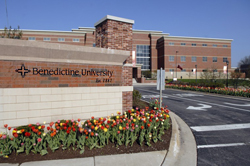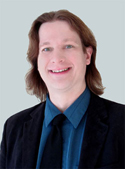 Tim Marin is an Associate Professor and Chair of the Departments of Chemistry and Physics at Benedictine University in Lisle. For nine years, he has worked as an academic. Navigating these waters, he has accumulated a wealth of experience and knowledge.
Tim Marin is an Associate Professor and Chair of the Departments of Chemistry and Physics at Benedictine University in Lisle. For nine years, he has worked as an academic. Navigating these waters, he has accumulated a wealth of experience and knowledge.
Before his academic position Tim was a postdoc at Argonne in the Chemistry Sciences and Energy Division. He performed research with the radiation and photochemistry group from 2001 to 2003. As a graduate student he was performing ultrafast spectroscopy and he then switched to radiation-induced kinetics as a postdoc. This departure was a drastic change for him. “My Argonne mentors were patient and supportive enough to deal with me learning something that was completely new in my eyes,” says Tim. He found that the experience was liberating. He was given enough autonomy to take the initiative and lead in his research projects. The results were impressive. “I produced multiple papers and presented at three different conferences,” said Tim. This success spurred him forward. He also learned many important lessons in the process of writing grant proposals and the politics of doing science.
This primer helped him when he moved into academia. He started out teaching at the nearby Moraine Valley Community College while at Argonne so he could build up his resume. This experience was necessary in preparation for applying for permanent faculty positions. Universities and institutions are looking for Ph.Ds. that are exceptional candidates with plenty of experience not only in teaching, but grant writing and undergraduate mentorship. Universities especially like to see the mentorship fall in the arena of undergrad research. It is also important to publish. As the saying goes, “publish or perish” holds true now, more than ever before.
“If an opportunity arises to help do some grant writing while on a postdoc appointment, do it,” says Tim. He also advises for postdocs to maintain collaborations with Argonne and their graduate schools. This will greatly help postdocs down the road in making the transition into doing their own unique research. Tim also found that attending major conferences, taking part in discussion groups and seeking out networking opportunities helped him as well. “Check the Chronicle of Higher Education, C&E News, Physics Today and similar journals for job postings,” says Tim. Many regional or local sections of professional societies also host an informal “job club” at their regular meetings, where networking with scientists in the geographic area can be constructive in getting inside leads on jobs. He also recommends applying early for positions and allowing plenty of time to get letters of recommendation and other materials in order.
What Tim found from his experiences was that flexibility helped make the difference. He advises postdocs to take on one year appointments such as a sabbatical replacement position if one becomes available. It shows one’s eagerness to work in academia. “This will only bolster your resume to apply for a tenure-track job the following year,” says Tim. This method is a great way for postdocs to get their foot in the door.
Tim also found that generous compensation packages are sometimes hard to find. One needs to be realistic and understand that like achieving their Ph.D. they will need to build towards higher salaries and tenure. It is a process. For starters an assistant professor survives on one-year probationary contracts until obtaining tenure. Tim underwent a mini-review each year. He had to submit a portfolio of his accomplishments and plans to the Department Chair, Dean and Provost. This was a necessary experience to be approved to receive a contract for the following year.
Tim wanted to teach and be a part of academia and understood this was the path to his future goals. In his third year he submitted a special third year review portfolio, which functions as an intent of tenure. “At this point, it’s expected that the faculty member has at least one publication, has submitted a grant application as principal investigator, has taken on undergraduates as research mentees, gotten involved with university committee work and honed his or her teaching approach based upon student reception and faculty peer reviews,” says Tim. In the sixth year, a similar intent of tenure package is submitted where further growth in scholarly work, teaching skills and philosophy and university service is expected. As one can see this is a detailed and involved process, but one filled with promise and reward.
Tim also found that start-up packages of $500,000 don’t exist at primarily undergraduate institutions unless you are a rock star in your respective field and the university has an impressive endowment. A typical start-up package is $20,000 to $40,000. One can also expect to find an explicit layout for a teaching load. Nine to twelve hours per semester is a typical load. While these facts might be daunting for some, Tim has found his academic experiences enriching and worthwhile. “There are several reasons that make working in academia at an institution like Benedictine so enjoyable,” notes Tim. “At a relatively small liberal arts university, you directly interact with students much more than at a top research university, and it’s very rewarding to see their intellectual growth and progress.”
Tim has had the opportunity to lecture on multiple topics and mentor 14 undergraduate research students. At Benedictine he has taught thermodynamics, quantum mechanics, statistical mechanics, kinetics and general chemistry to name a few courses. “The flexibility of the position itself is amazing. Generally, a faculty member has an incredible amount of autonomy and liberty to design his or her own curriculum, research and to participate in the university community to whatever extent is desired,” describes Tim.
Since joining Benedictine, Tim has maintained his connections to Argonne. He currently holds a faculty special term appointment at Argonne and continues to perform research and collaborate with the laboratory on several projects.
 Dr. Tim Marin is an Associate Professor and Chair of the Departments of Chemistry and Physics at Benedictine University in Lisle. He holds a Ph.D. from Northwestern University in Physical Chemistry. His primary research has involved vacuum UV spectroscopy, which he carries out at the Synchrotron Radiation Center, at the University of Wisconsin at Madison.
Dr. Tim Marin is an Associate Professor and Chair of the Departments of Chemistry and Physics at Benedictine University in Lisle. He holds a Ph.D. from Northwestern University in Physical Chemistry. His primary research has involved vacuum UV spectroscopy, which he carries out at the Synchrotron Radiation Center, at the University of Wisconsin at Madison.
He also performs research in radiation chemistry at Argonne and the University of Notre Dame’s Radiation Laboratory. In his spare time, he enjoys performing in live bands and has recorded three CDs and holds copyrights on more than 60 songs.

